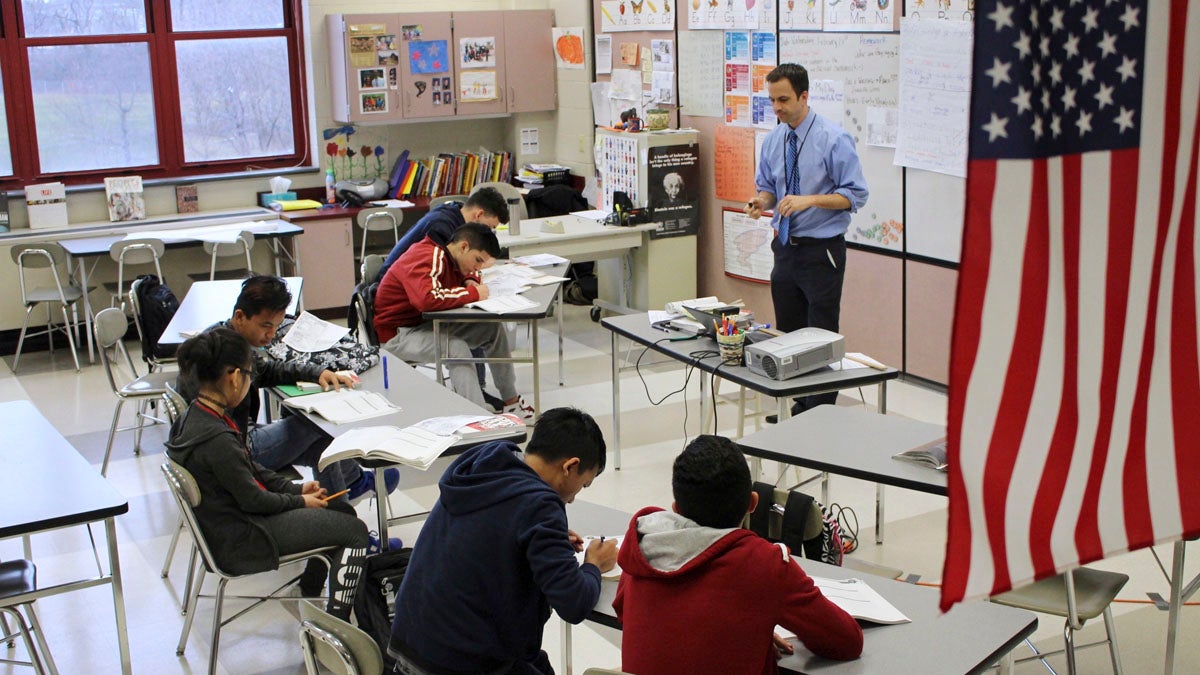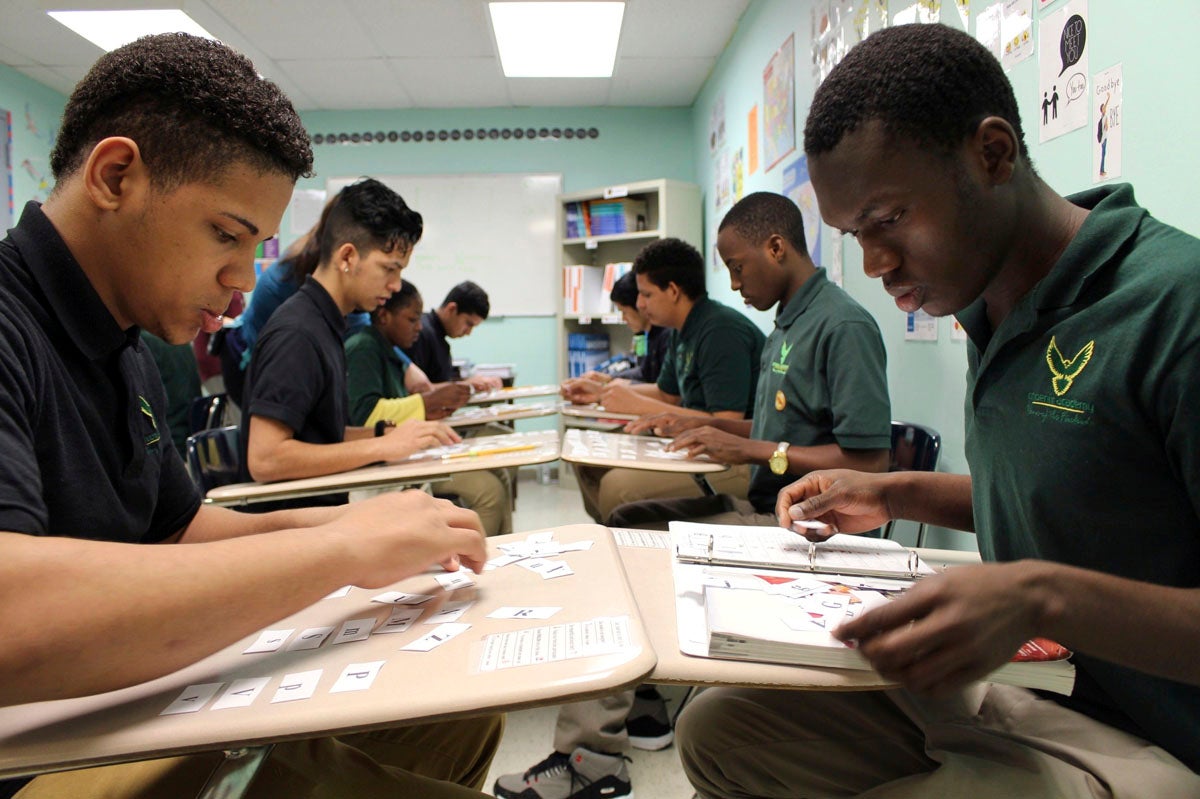Refugee education lawsuit will cost Lancaster schools more than $600K next year

In this Feb. 15, 2017, photo, Eric Hoover teaches his class of immigrant and refugee students at McCaskey High School in Lancaster, Pa. (AP Photo/Michael Rubinkam)
The city of Lancaster resettles a lot of refugees for a community of its size, and various stakeholders have long collaborated with the district for school-based programs designed to help entire families from this vulnerable population.
So when the School District of Lancaster was sued one year ago, officials argued that they — not the courts — knew best how to deal with their own students.
But Judge Edward G. Smith found last year that the School District of Lancaster had violated the federal Equal Educational Opportunities Act by delaying or denying enrollment of older refugee students and diverting them to a magnet school with less support for English Language Learners than the mainstream high school and its Newcomer Program designed for first-year ELLs (formerly known as the International School).
And now, the School District of Lancaster is looking at spending more than half a million dollars, less than 1 percent of its $208 million annual budget, as a result of the lawsuit, according to school officials.
“Obviously, it did impact our budget and did take away from other district programs,” Superintendent Damaris Rau said Wednesday.
The district isn’t laying off anyone as a result of the lawsuit, but will delay an administrative development for teachers and adding instructional staff to under-performing schools, Rau says.
Recurring costs
Most of the district’s out-of-pocket lawsuit expenses ($475,000) are for salaries and benefits for five positions required in the consent decree signed by Smith and attorneys for both sides two weeks ago. Those will be recurring, as will an anticipated (but unkown) added cost for translation services driven not only by the lawsuit but also by changes to Pennsylvania law, according to ESL coordinator Amber Hilt.
Lancaster’s school district already hired four of five new staffers: three teachers for the Newcomer School (one each in science, social studies and math) and an enrollment specialist who will oversee enrollment and placement of immgrant ELLs.
Hilt says the district is in the process of bringing on the program facilitator, who will monitor ELLs’ progress, evaluate Newcomer curriculum and help ELLs develop post-high school plans in conjunction with guidance counselors, required by the decree.
Because the district’s insurer will cover most legal fees, premiums could rise, too. But at this point, it’s unclear by how much.
 School District of Lancaster Superintendent Damaris Rau. (AP Photo/Michael Rubinkam)
School District of Lancaster Superintendent Damaris Rau. (AP Photo/Michael Rubinkam)
One-time costs
Under the consent decree, the district has some one-time expenses as well.
Lancaster has paid at least $50,000 to defend the lawsuit, according to spokeswoman Kelly Burkholder.
Another $70,000 in litigation costs will go to the students’ lawyers, according to the consent decree.
The district also will pay up to $67,000 of eligible students’ education expenses. Each of the six plaintiffs will get $3,000. Other affected students will be eligible for up to between $1,000 and $1,500, depending on whether they were diverted to Phoenix or out-right denied enrollment (at least 30 people, according to Maura McInerney, senior attorney at the Education Law Center in Philadelphia).
McInerney and other plaintiffs’ attorneys will get another $300,000 in fees — and defense attorneys, another $100,000 — all covered by the district’s insurer.
 Student Shukuru Amanya, 18, stands outside Phoenix Academy in Lancaster, Pa. The Lancaster community runs an “international school” on its main high school campus to help the waves of new arrivals sponsored by local resettlement agencies learn English and adjust to American schools. But the practice of sending the ones who are over 16 and have no school records to Phoenix, an alternative school across town, that critics say is a diploma mill, was the center of a lawsuit against the school district. (AP Photo/Michael Rubinkam)
Student Shukuru Amanya, 18, stands outside Phoenix Academy in Lancaster, Pa. The Lancaster community runs an “international school” on its main high school campus to help the waves of new arrivals sponsored by local resettlement agencies learn English and adjust to American schools. But the practice of sending the ones who are over 16 and have no school records to Phoenix, an alternative school across town, that critics say is a diploma mill, was the center of a lawsuit against the school district. (AP Photo/Michael Rubinkam)
Case trajectory
The case was initiated on behalf of six refugee students by a legal team led by lawyers from the ELC and American Civil Liberties Union of Pennsylvania.
Within a couple months, Smith issued a preliminary injunction to the district to change enrollment and placement procedures for refugee students between the ages of 17 and 21 during the current school year until the larger issues of the case could be hashed out.
After losing an appeal, Lancaster’s Board of School Directors approved a settlement in March.
But it lacked much of the detail included in Smith’s 27-page consent decree.
Decree in detail
To start, the consent decree establishes that students who weren’t named in this lawsuit can get compensatory money if the district can establish they were between the ages of 17 and 21 and attempted at some point since 2013 to enroll in Lancaster school, but couldn’t.
It also mandates that students with the least English proficiency start out at McCaskey High School’s Newcomer School. The program is designed for first-year students with limited English proficiency.
In the past, that happened sometimes — but not always — particularly for LEP students over the age of 16. The older students often ended up at Phoenix Academy.
Phoenix consolidates classes so students can meet graduation requirements before they turn 21. After that, they’re no longer entitled to free education under Pennsylvania law.
School officials testified during hearings last summer that this decision was meant to ensure students leave high school with a diploma — without which, it’s almost impossible to get a job paying anywhere close to a living wage, they said.
But some students said they struggled to understand what was happening around them and felt they were wasting their time. Testimony of recent graduates, and those on track to do so, also cast doubt on their mastery of the language, comprehension and other skills some, including Judge Smith, might expect would be required at that stage.
The consent decree attempts to address all of this by laying out not only procedures for placing children with limited English proficiency upon enrollment, but also for transferring them once their language skills have progressed.
Other parts of the decree reiterate existing state and federal laws that weren’t being followed consistently in Lancaster, with some fine details.
For example:
When it comes to decisions about enrollment and placement — transfers, dropping out, whether the student’s on track to graduate, etc. — schools already must meet with parents and, if parents have limited English proficiency, give them documents spelling out students’ options translated into the family’s home language. Districts also have to provide an interpreter at the meeting. But now, in Lancaster, the school has to provide the documents at least three days ahead of the meeting and give families two days to make a decision.
The district also has to submit compliance reports and data on enrollment, language proficiency test scores, student progress, etc., to the lawyers who brought the lawsuit.
“We’ve always been keeping the data, but now we have a commitment to make sure we are running it and reviewing it regularly,” Hilt says. “I think anytime we look at the demographics and any of their data, whether it be from socio-emotional side or academic side, it’s always helpful to support students and families.”
 Patient Inganya, right, and Enrique Veliz, left, do classwork at Phoenix Academy in Lancaster, Pa. (AP Photo/Michael Rubinkam)
Patient Inganya, right, and Enrique Veliz, left, do classwork at Phoenix Academy in Lancaster, Pa. (AP Photo/Michael Rubinkam)
Wider implications?
Meanwhile, stakeholders in some other Pennsylvania communities, including Philadelphia, Harrisburg and Reading, have been watching the case.
And the conclusion provides them a rundown of what McInerney and her colleagues believe are best practices in the consent decree.
“Anecdotally, we’ve definitely heard about issues similar (to what was happening in Lancaster),” says Sundrop Carter, executive director of the Pennsylvania Immigration and Citizenship Coalition. “But I don’t think there was widespread awareness of this lawsuit.”
To start, there are 500 school districts in Pennsylvania, Carter says.
And some of those who were paying attention at one point might have lost track of the case. It was filed before the general election and subsequent incarnations of a travel ban and reduced ceiling on refugee admissions.
Accordingly, advocates and other stakeholders have refocused their attention in the past year — in some cases, amid personnel and funding cuts (Church World Services’ Lancaster office, for example, is laying off two workers in August, according to director Sheila Mastropietro).
The outcome of the Lancaster case could prompt offiicals in other districts to revisit their own policies and procedures, Carter says, if they know about it.
“These kinds of lawsuits do have impact, but it takes a while,” says Carter, who works to educate school boards and other local government entities on best practices before these issues become a serious problem or get to court.
She pointed to the Allentown case in which U.S. citizen was detained for two weeks in the Lehigh County Jail because he was suspected [incorrectly, it turned out] of being in the country illegally.
The high-profile mistake and resulting federal court ruling prompted many counties to change their policies, but communication is tighter among county officials than school officials because there are fewer of them (67 versus 500 school districts), Carter says.
WHYY is your source for fact-based, in-depth journalism and information. As a nonprofit organization, we rely on financial support from readers like you. Please give today.



